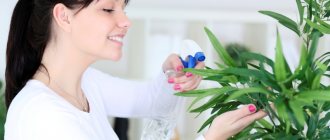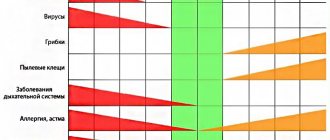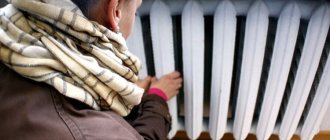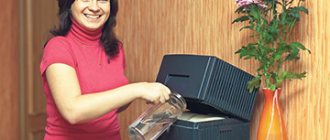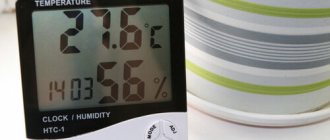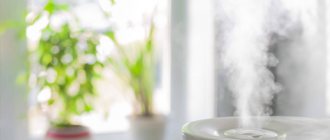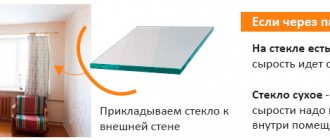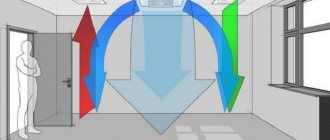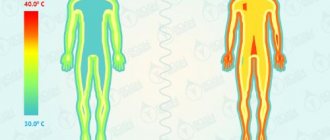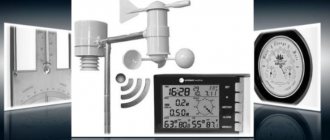The child's body is susceptible to bacteria and infections. Babies have not yet developed all their organs; parents need to create the most favorable conditions for their lives. First of all, you should understand what humidity is optimal and should be in an apartment for a newborn.
For the proper development and growth of children, it is necessary to maintain favorable conditions in the apartment.
The value of air humidity in a children's room
The humidity indicator is the most important factor that affects the health of not only children, but also adults. The state of the baby’s immunity depends on its value. Parents should know what humidity is normal for a newborn's nursery. They will need to maintain the required level.
On a note. If the value is less than 50%, then measures should be taken to increase the humidity level.
What are the dangers of dry air?
In winter, when the heating is turned on, the humidity level in apartments drops significantly, which is dangerous for babies. Due to lack of moisture, the child's body begins to lose resistance to harmful microorganisms. Dried mucous membranes become thin and cannot resist the penetration of viruses and bacteria.
Negative effects of dry air:
- Hair becomes dry, lifeless, and split ends appear. The skin becomes thinner, dermatitis, cracks and other problems appear.
- The viscosity of intestinal and gastric juice increases, which leads to a slowdown in digestive processes.
- There is a feeling of the presence of sand in the eyes, dryness and irritation are felt.
- In rooms with low humidity levels, respiratory allergens spread quickly.
- General weakness, dizziness, runny nose may occur, and the load on the heart increases. These symptoms are the result of thickening of the blood and slowing of its circulation.
- Dry mucous membranes allow more bacteria and germs to pass through, causing nosebleeds.
- With dry humidity, inflammation of the adenoids, cough, and the development of sore throats and other respiratory diseases are common.
On a note. If the humidity level is insufficient, in addition to people, pets and indoor plants suffer.
Effects of humid air
And too high humidity levels lead to health problems. People living in rooms where the air is too damp often get sick. The normal air humidity in an apartment for a child should be 65% in summer and 60% in winter. As humidity levels increase in your home, fungi and other harmful bacteria can begin to multiply.
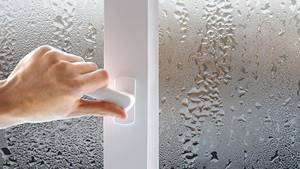
Constant condensation on the windows indicates that the air is too humid.
Consequences of high humidity:
- There is a smell of dampness and mold. The feeling of freshness in the house is lost and the feeling of stuffiness becomes stronger.
- Respiratory tract diseases occur more often, and they go untreated for a long time. Chronic diseases appear, such as asthma.
- Bed linen dries much slower in the house.
For your information. The most harmful is increased humidity for children with allergies.
Preventive vaccinations
Premature babies are vaccinated according to an individual vaccination schedule drawn up by a pediatrician. The guidelines are the child’s health status and psychomotor development.
Children born weighing less than 2 kg are not given the BCG vaccination (vaccine against tuberculosis) that is usual for all healthy newborns in the maternity hospital. It is performed later, when the child gains weight up to 2.5 kg, in a clinic at the place of residence.
Infants born weighing less than 1.5 kg receive a medical exemption from all preventive vaccinations until the end of 1 year of life.
Expert: Galina Filippova, general practitioner, candidate of medical sciences Author: Olesya Butuzova, pediatrician
The material uses photographs belonging to shutterstock.com
How and what to measure
Sleep norm for a child up to 1 year old per day - table
The level of humidity in an apartment for a child can be controlled by special devices (sensors and hygrometers). They display the measurement result as a percentage and suggest what value should be in the apartment for a newborn using sound signals. They are easy to use.
For home you can use:
- wireless thermohygrometers that report deviations with an audible signal;
- digital instruments that measure, in addition to humidity, temperature;
- hair hygrometers, which contain synthetic fibers (hair).
Such devices must be installed in a room away from heating devices, so that there are no drafts.
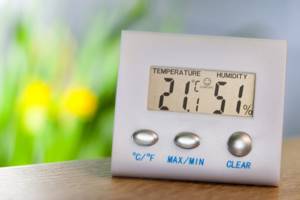
Special instruments are used to measure humidity levels
On a note. To humidify the air in a child's room, it is recommended to purchase special humidifiers. They often have built-in sensors that allow you to monitor humidity levels.
A simple measuring device can be an ordinary glass. Pour some water into it and put it in the refrigerator until the temperature of the liquid reaches +3-5 °C. Then they take it out and put it in the room. If the condensation that appears on the walls of the glass dries quickly (3-5 minutes), then the level of importance is low. If streams appear on the glass, then the air is over-humidified. Under normal conditions, the state of condensation on the walls of the glass will not change within a few minutes.
A pine cone will help you roughly measure the humidity. They put it in the room and leave it for several hours. If the scales are pressed to the base, the air is over-humidified; if they open, the air is over-dried. With normal values there will be no changes.
Feeding a premature newborn
Premature babies require frequent feeding, at least 10 times a day. This allows them not to lose strength for prolonged sucking and gain weight. Make sure your baby does not spit up milk or formula. If regurgitation occurs regularly, consult a doctor for help. This situation can prevent you from gaining weight.
The lower the child's initial weight, the slower it increases. During the first 2 weeks, the baby usually even loses weight, but, as a rule, begins to gain weight from 3–4 weeks, 100–200 g per week. At 3-4 months he will double his weight.
Air humidification devices
Salts in the urine of a child under one year old - normal and increased levels
Optimal air humidity in an apartment for a child can be maintained using improvised means or special devices. There are several models, which differ in their operating mechanism:
- Using cold steam. The disadvantage of such a device is that it requires the use of distilled water, since tap water will lead to rapid clogging.
- Ultrasonic devices. They cover large areas. Control is carried out by remote control.
- Steam humidifiers that work on the principle of hot steam. They almost always have hygrometers built into them.
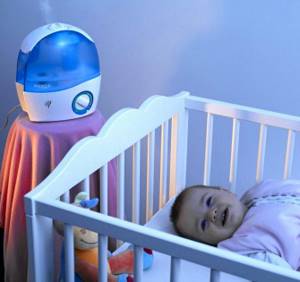
You can install a special device in the child’s room
If it is not possible to buy a special device, then you can increase the humidity level in the room using improvised means:
- pots with indoor flowers, which are regularly sprayed with a spray bottle;
- place containers of water in the room or hang wet things.
These simple steps will help you quickly get rid of dry air.
How to Maintain Optimal Performance
Leukocytes in the stool of a child under one year old - the norm, reasons for the increase
It is not difficult to control the microclimate in a house or apartment. Not only special devices, but also improvised means help in such situations. If you combine all the methods, the result will be excellent.
Ways to increase
By following simple rules, you can quickly increase the humidity level and maintain it at normal:
- You can install an aquarium or a decorative miniature fountain in a baby’s room or apartment.
- Dust and wash floors frequently.
- Try to use air conditioners and other heating devices less often (only if necessary).
- To urgently increase humidity, you can hang laundry around the rooms after washing or spray water with a spray bottle.
- Get more indoor plants on your windowsills.
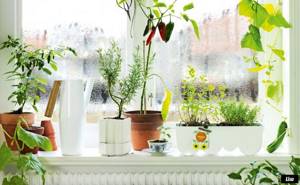
A large number of plants on the windows helps get rid of excessive dryness
Such simple measures will help maintain normal humidity levels in winter.
How to reduce humidity
If the room has a high level of humidity, then it should be reduced. To do this, you can perform the following activities:
- Turn on the heater in the room every day (for 15-20 minutes).
- Ventilate the room daily, regardless of the weather.
- Purchase special tablets to absorb moisture, which are placed around the perimeter of the room.
- Buy a special dehumidifier.
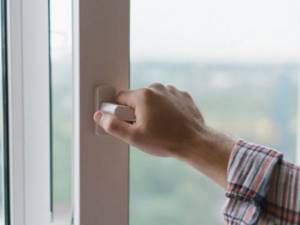
Frequent ventilation helps remove excess moisture from the air
With the purchase of a special device to reduce humidity levels, the indicators are normalized in a few hours.
Doctors' supervision
Premature babies require not only high-quality home care, but also constant medical supervision. Dispensary observation is established at the place of residence for up to 7 years. Premature babies require constant monitoring by a pediatrician and regular consultations with a neurologist.
During the first 2 years of life, a premature baby is under the supervision of a cardiologist. An electrocardiogram should be performed regularly (at 2, 4, 6 and 12 months of life). An ECG allows you to assess the condition and functioning of the heart muscle. An ultrasound examination of the heart (echocardiography) is also performed. This study allows you to identify congenital heart defects, developmental anomalies and anatomical defects. Echocardiography is performed 4 times during the first 2 years of life (at 2, 6, 12 and 24 months).
At the age of 2 weeks, it is recommended to start preventing rickets. Vitamin D, massage, hardening, and ultraviolet irradiation are prescribed.
Electric heating pads and blankets should not be used to warm premature newborns. It is strictly forbidden to place heating pads under or on top of a child.
Komarovsky's opinion
The famous pediatrician Komarovsky has his own opinion about what humidity should be in a newborn’s nursery. The optimal rate is 60% for a healthy baby. In his opinion, there are no differences in summer and winter values. The optimal level of humidity in the apartment for a baby should be observed in any season: autumn, winter or spring. If the baby is sick, then the room where he is located should have an indicator of at least 70%. With these values, the mucous membranes will not dry out, which will allow the baby’s body to quickly cope with bacteria.
Air humidity is an important indicator that parents should monitor from the very birth of their child. Any changes are immediately felt by the baby. If it is not possible to install special devices, then you can control the value and keep it normal using improvised means.
Caring for a premature baby: the first month at home
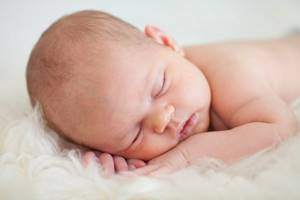
Premature babies are not only small in height and weight. Their organs and systems are immature, so such babies require special attention and careful care.
health, premature babies
The baby is discharged home when his weight reaches 2,000 g, he actively sucks and gains weight. When caring for a premature baby at home, a number of factors should be taken into account: air temperature and humidity, frequency of meals, walks, clothing, etc.
Babies born before 37 completed weeks of pregnancy are considered premature. They typically weigh less than 2,500 g and are less than 45 cm long.
